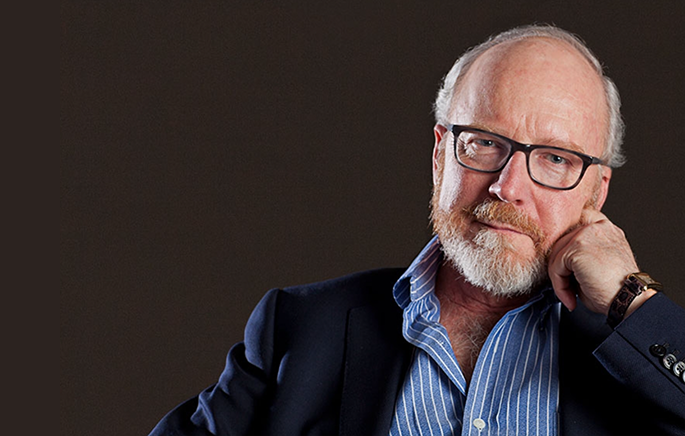In boardrooms and cubicles around the world, an insidious emotion is taking hold: fear. According to John Hagel III, a veteran business strategist and author of influential works such as The Power of Pull and The Only Sustainable Edge, this pervasive anxiety about the future is hampering innovation, stifling growth, and eroding trust in institutions.
In his latest book, The Journey Beyond Fear, Hagel argues that to thrive in an era of rapid change, individuals and organizations must learn to move beyond fear and cultivate more positive emotions. It’s a departure from his previous focus on business ecosystems and strategy, as seen in Net Gain and Net Worth, but one that Hagel sees as crucial in today’s fast-paced, uncertain business environment.
Hagel’s interest in this topic was piqued about seven years ago as he traveled the globe for work. “Everywhere I went, the dominant emotion that I was encountering was fear,” he recalls, “at the highest levels of organizations, at the lowest levels, out in the communities.” While this was understandable given the pace of change and mounting performance pressure, Hagel believes this fear is ultimately self-defeating.
Hagel will be discussing these ideas at the upcoming Emerging Tech Management Week: Silicon Valley program, scheduled to be held at UC Berkeley in early November. This six-day program, jointly developed by Cheung Kong Graduate School of Business (CKGSB) and UC Berkeley College of Engineering, aims to equip participants with strategies to harness emerging technologies and drive innovation. Hagel’s perspectives on moving beyond fear to embrace opportunity are particularly relevant in this context of rapid technological change and disruption.
The consequences of fear in the business world are far-reaching. According to Hagel, fearful individuals and organizations tend to shrink their time horizons, focusing solely on immediate concerns rather than long-term opportunities. They become risk-averse, unwilling to pursue potentially transformative innovations. Perhaps most damagingly, fear erodes trust, both within organizations and between businesses and their stakeholders.
This erosion of trust is particularly concerning. Hagel points to surveys showing declining faith in major institutions worldwide, including corporations, governments, and media. “Very few, if any, people have asked the question, Why? Why is trust eroding? And what can we do to rebuild trust?” he asks.
Part of the answer, Hagel suggests, lies in how we think about leadership. The current paradigm, which prizes leaders who project certainty and claim to have all the answers, is fundamentally at odds with a rapidly changing world.
If you have a leader who says they have the answer to all the questions, there are two options,” Hagel argues. “One is they don’t understand how rapidly the world is changing, or they’re lying. In either case, why would you trust that leader?”
Instead, Hagel advocates for a new model of leadership centered on asking questions and admitting to uncertainty. This approach, he contends, sends a crucial message: that questions are not just acceptable but essential, and that seeking help is a strength rather than a weakness. Such vulnerability from leaders can help rebuild trust and create a culture more conducive to innovation and growth.
But how can organizations and individuals move beyond fear to embrace a more positive outlook? Hagel proposes three interconnected “pillars of positivity”: narratives, passion, and platforms.
The Power of Narrative
Narratives, in Hagel’s framework, are distinct from stories. While stories are self-contained and focus on the storyteller or other characters, narratives are open-ended and centered on the audience. They present a significant opportunity or challenge in the future and call the listener to action, emphasizing how their choices will shape the outcome.
Hagel argues that narratives can be powerful catalysts for change, both at the individual and organizational level. They can help shift emotions and perspectives, moving people from a mindset of fear to one of opportunity. Importantly, narratives operate at multiple levels. Individuals can have personal narratives that guide their career choices and life decisions. Companies can craft narratives that inspire employees and customers alike. Even geographical regions and social movements can harness the power of narrative to drive change and mobilize support.
Hagel cites Apple’s “Think Different” campaign from the 1990s as a prime example of an effective corporate narrative. Unpacking the slogan, he explains: “For decades we had digital technology that took away our names, gave us numbers, put us in cubicles, made us cogs in a machine. Now, for the first time, there’s a generation of technology which can help us express our potential and individuality, but it’s not going to happen automatically. You need to think different. Will you think different?”
This narrative, Hagel argues, went far beyond simply selling products. It tapped into a deep aspiration shared by many and invited customers to participate in a broader movement. The result was a level of brand loyalty that, for some consumers, approached religious fervor.
Unfortunately, such powerful narratives are rare in the corporate world. When Hagel speaks to executives about narratives, they often point to origin stories or tales of overcoming obstacles. But these are backward-looking accounts. They focus on the company rather than the customer, and in doing so they fail to harness the true power of narrative as a call to action.
Hagel emphasizes that effective narratives should be forward-looking, focused on significant opportunities that lie ahead. They should articulate how the audience – be it customers, employees, or citizens – can play a crucial role in realizing these opportunities. This approach not only inspires but also empowers, turning passive observers into active participants in shaping the future.
Harnessing the Passion of the Explorer
The second pillar in Hagel’s framework is passion — specifically, what he terms the “passion of the explorer.” This concept emerged from Hagel’s research into environments characterized by sustained, extreme performance improvement.
Individuals with this passion, Hagel explains, share three key characteristics. First, they are excited about having an increasing impact in a specific domain. Second, they actively seek out unexpected challenges as opportunities for growth. Finally, when confronted with these challenges, their instinct is to connect with others who can help them find better solutions more quickly.
Hagel illustrates this concept with an unlikely example: big wave surfing. Despite the very real dangers involved, elite surfers eagerly paddle out to ride massive waves. Their fear is present but overshadowed by their excitement about pushing boundaries and achieving something unprecedented.
This passion, Hagel argues, is not limited to extreme sports or creative pursuits. It can—and should—be cultivated in the business world. The key is for companies to focus on missions that genuinely excite both employees and customers, rather than solely on profit. Hagel contends that this passion is innate in all of us, pointing to the natural curiosity and exploratory behavior of young children. However, he argues that traditional education systems and corporate structures often suppress this passion, prioritizing conformity and risk-aversion over innovation.
Rekindling this passion in the workplace requires a shift in how we view work and leadership. It involves creating environments where questions are encouraged, challenges are embraced, and collaboration is the norm. Leaders play a crucial role in this transformation, not by providing all the answers, but by asking questions and demonstrating a willingness to learn and explore alongside their teams.
Hagel believes that cultivating the passion of the explorer can lead to unprecedented levels of innovation, engagement, and performance. In a world of mounting performance pressure, he argues, this passion isn’t just beneficial—it’s essential for long-term success and fulfillment.
Platforms for Accelerated Learning
The final pillar in Hagel’s framework is platforms. But unlike the digital platforms that dominate today’s business discourse, Hagel envisions a new type of platform focused on accelerated learning.
These “learning platforms” would be designed to help participants create entirely new knowledge, rather than simply share existing information. Hagel argues that this type of learning—creating knowledge that never existed before—is the most crucial in a rapidly changing world.
While few, if any, platforms currently fit this description, Hagel points to historical examples that hint at their potential. One such case is Portal Player, a company founded in the 1990s to develop technology for digital music players. Recognizing the complexity of the challenge, Portal Player created a platform that brought together experts from various technologies to collaborate and innovate. The result was rapid advancement that laid the groundwork for products like Apple’s iPod.
Hagel emphasizes that these learning platforms should be designed with specific principles in mind. They should foster small group collaboration, as he believes that groups of 3-15 people who share a passion can learn faster and more effectively than individuals working alone. These platforms should also provide rapid feedback mechanisms, allowing participants to quickly gauge the impact of their actions and adjust accordingly.
Hagel suggests that these platforms should connect diverse groups, enabling cross-pollination of ideas from different domains. This interdisciplinary approach can lead to breakthrough innovations that might not emerge in siloed settings.
The power of these platforms, according to Hagel, lies in their ability to scale learning and innovation. By creating environments where passionate individuals can come together, tackle meaningful challenges, and learn rapidly, organizations can tap into a wellspring of creativity and problem-solving capability.
Hagel believes that such platforms could revolutionize individual companies, as well as entire industries and economies. By accelerating the creation of new knowledge and fostering collaboration, these platforms could help address complex global challenges and drive unprecedented levels of innovation and growth.
Strategies for Cultivating Positivity
How can leaders put these ideas into practice? Hagel suggests several strategies. One approach, which he calls “zoom out, zoom in,” involves focusing simultaneously on two time horizons: a 10-20 year vision of transformative opportunities, and a 6-12 month plan of initiatives to accelerate progress toward that vision. This strategy can help overcome skepticism by pairing long-term inspiration with tangible short-term progress.
Another technique, which Hagel terms “scaling the edge,” involves identifying a small part of the business that represents an early manifestation of a major future opportunity. By nurturing and scaling this “edge,” organizations can drive transformation without the disruption of top-down, all-at-once change efforts.
Hagel offers the example of Li & Fung, a century-old Chinese company, to illustrate the power of “scaling the edge” in business transformation. Originally a simple deal-maker in the apparel industry, Li & Fung saw the potential for a more complex, advisory role as global supply chains evolved. The company started small, creating a business unit with just three people dedicated to deeply understanding and serving a single apparel designer.
This “edge” of the business, focused on becoming trusted advisors, proved so successful that Li & Fung scaled it dramatically. They replicated the model with other designers, gradually transforming the core of their business. This approach allowed Li & Fung to tap into unmet market needs and achieve significant revenue growth, all while managing the risks inherent in major organizational change.
Ultimately, Hagel argues, the ability to move beyond fear and embrace more positive emotions will be crucial for success in an increasingly complex and rapidly changing business environment. While long-term trends are creating mounting performance pressure, they are also generating “exponentially expanding opportunity,” he notes.
We can create far more value with far less resources, far more quickly than would have been imaginable a few decades ago.”
The challenge is that fear often blinds us to these opportunities. By cultivating narratives that inspire, harnessing the passion of the explorer, and creating platforms for accelerated learning, Hagel believes organizations can overcome fear and tap into unprecedented potential for growth and innovation.
This shift will require a fundamental rethinking of leadership, education, and organizational culture. But for Hagel, it’s not just an opportunity—it’s an imperative. In a world of exponential change, those who remain paralyzed by fear risk being left behind. The future, he suggests, belongs to those who can look past the dangers to see the possibilities.
For More Information:
Emerging Tech Management Week: Silicon Valley
The Journey Beyond Fear
https://www.independent.org/publications/tir/article.asp?id=1745




















